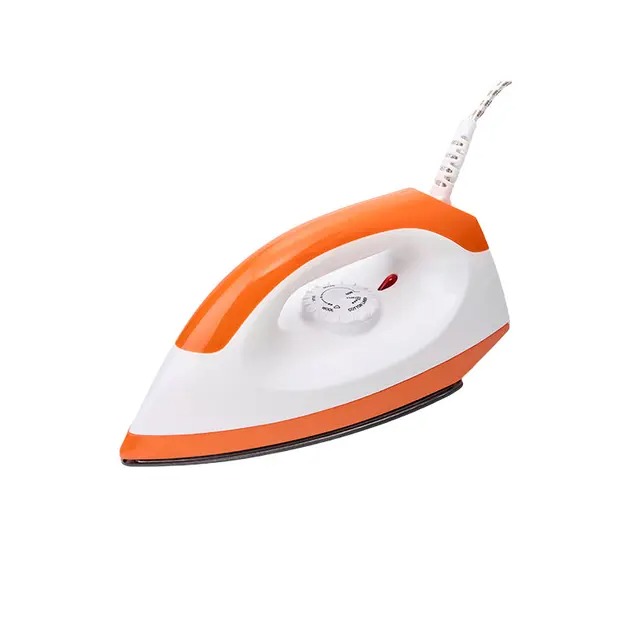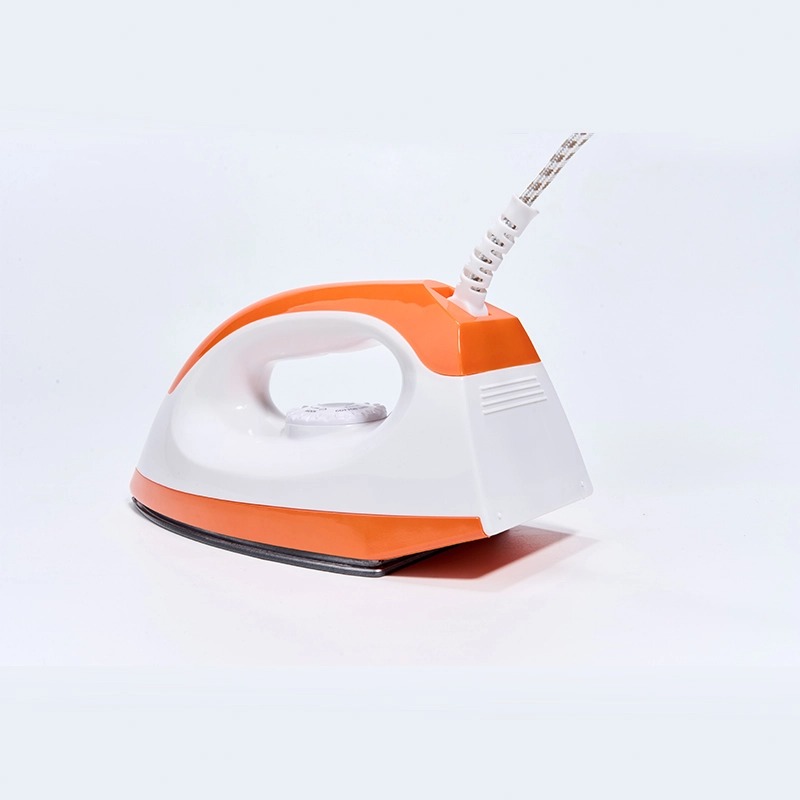- All
- Product Name
- Product Keyword
- Product Model
- Product Summary
- Product Description
- Multi Field Search
Views: 196 Author: Site Editor Publish Time: 2025-09-17 Origin: Site








Clothing care has evolved, but one tool remains timeless in households, hotels, and fashion studios alike—the hand iron. While steamers and modern fabric care gadgets gain popularity, handheld irons continue to play an essential role in maintaining crisp, polished garments. But what exactly is a hand iron used for? Beyond flattening wrinkles, it’s a versatile tool with applications in professional tailoring, home upkeep, and even creative projects. This guide explores the multiple uses, advantages, and comparisons that define handheld irons, helping you understand why they remain a must-have item.
A handheld iron (or hand iron) is a compact, manually operated appliance designed to press fabric, remove wrinkles, and enhance the look and feel of garments. Unlike large commercial presses, these irons are lightweight and easy to maneuver, making them ideal for both household and professional use.
While most people associate hand irons only with flattening clothes, their function is broader. They work by applying a combination of heat, pressure, and sometimes steam to fibers, allowing them to reset into a smooth, structured finish. This principle makes handheld irons indispensable not only for daily wardrobe maintenance but also for industries such as tailoring, laundry services, and even crafting.

The most common use of a hand iron is refreshing clothes. Wrinkled garments can project an unkempt appearance, and handheld irons solve this instantly.
Shirts and blouses: A crisp collar and smooth sleeves are often the difference between casual and professional looks.
Trousers and skirts: Irons help define creases in dress pants or keep pleats sharp.
Dresses: Delicate fabrics like silk require controlled heat, something modern handheld irons are designed to deliver.
Uniforms: From school outfits to military wear, a hand iron ensures consistency and polish.
| Garment Type | Key Ironing Benefit | Recommended Setting |
|---|---|---|
| Cotton shirts | Removes deep wrinkles | High heat + steam |
| Wool trousers | Maintains crease line | Medium heat + steam |
| Silk blouse | Prevents shine marks | Low heat, no steam |
| Polyester dress | Smooths light wrinkles | Low-medium heat |
By tailoring heat and steam levels, handheld irons adapt to a variety of fabric needs, ensuring safe and effective care.
In tailoring shops and fashion design studios, handheld irons are not optional—they are essential. Precision ironing shapes garments, sets seams, and prepares fabrics for final presentation.
Seam setting: After stitching, tailors press seams flat to make garments look polished.
Pleat definition: Hand irons create sharp, long-lasting pleats in skirts and dresses.
Fabric shaping: Controlled steam helps mold collars, cuffs, and lapels into the right form.
Sample preparation: Before runway shows or client fittings, designers rely on handheld irons to give samples a flawless finish.
Unlike garment steamers, which only relax wrinkles, handheld irons combine heat and directional pressure, giving professionals the exact finish they need.
For frequent travelers, business professionals, or performers, handheld irons are a lifesaver. Compact, lightweight models easily fit in luggage and help maintain a polished appearance anywhere.
Business trips: Smooth shirts before client meetings or conferences.
Vacations: Refresh clothes that have been compressed in suitcases.
Performances: Stage costumes and uniforms are often quickly touched up with portable irons.
| Scenario | Advantage of Handheld Iron | Alternative |
|---|---|---|
| Business travel | Keeps suits and shirts sharp | Hotel laundry (costly & time-consuming) |
| Backpacking | Refreshes minimal wardrobe | Portable steamer (less crisp results) |
| Events | Instant polish before stage time | Relying on wardrobe crew |
Travel-friendly handheld irons often feature dual voltage systems, foldable handles, and fast heat-up times, making them practical for international use.
Surprisingly, the utility of handheld irons extends far beyond clothing care. Around the house, they serve multiple purposes:
Curtains and drapes – Quickly smooth fabric panels without taking them down.
Table linens – Create a hotel-like crisp finish on tablecloths and napkins.
Bedding – Tidy up pillowcases, sheets, and duvet covers for a luxury look.
Crafting – Quilters and crafters use hand irons to press fabric pieces during projects.
Adhesive applications – Some projects, like fusing patches or heat-transfer vinyl, rely on hand irons to activate adhesives.
This versatility makes handheld irons more of a multi-tool than a single-purpose device, offering both functional and creative advantages.
Consumers often debate: should they buy a handheld iron or a garment steamer? While both aim to smooth fabrics, their strengths differ.
| Feature | Handheld Iron | Garment Steamer |
|---|---|---|
| Primary function | Removes wrinkles with heat + pressure | Relaxes wrinkles with steam |
| Best for | Structured garments (shirts, trousers, uniforms) | Delicate or flowing fabrics |
| Portability | Compact, travel-ready | Bulkier, less luggage-friendly |
| Finish | Crisp, sharp creases | Soft, relaxed drape |
| Versatility | Works on clothes + linens + crafts | Mostly clothing only |
The takeaway: if you want crispness and versatility, choose a hand iron. For quick refreshes on delicate dresses, a steamer may suffice. Many professionals use both, but a handheld iron often delivers more lasting results.
To maximize the life and performance of a hand iron, proper care is essential.
Descaling: Regularly clean water tanks and steam vents to prevent mineral buildup.
Surface cleaning: Use a damp cloth to remove residue from the soleplate.
Heat setting discipline: Always match the iron’s temperature to the fabric care label.
Storage: Allow the iron to cool fully before storing upright to avoid cord damage.
Maintaining these practices ensures consistent results and prevents accidents such as burns or fabric scorching. Modern handheld irons also include safety features like auto shut-off to enhance protection.

Not all handheld irons are created equal. Selection depends on your usage habits, fabrics, and travel requirements. Key factors to consider:
Heat control – Adjustable temperature settings for different fabrics.
Steam options – Continuous steam or burst functions for tougher wrinkles.
Weight and ergonomics – Comfortable grip and maneuverability.
Soleplate material – Stainless steel and ceramic provide smooth gliding.
Travel features – Dual voltage, compact design, quick heat-up.
By evaluating these criteria, buyers can choose a model tailored to their lifestyle—whether for household, professional, or travel use.
So, what is a hand iron used for? Far more than just wrinkle removal. From ensuring professional attire looks polished to aiding in household upkeep and creative projects, handheld irons are versatile tools with enduring relevance. Their ability to combine heat and pressure makes them distinct from garment steamers, offering crisp finishes that no other device replicates. Whether at home, in the studio, or on the go, a hand iron remains an essential companion for those who value appearance, precision, and versatility.
1. Can handheld irons damage fabrics?
Yes, if used on the wrong setting. Always check fabric care labels and adjust the temperature accordingly.
2. Are handheld irons suitable for delicate fabrics?
Yes, modern irons have low-heat settings for silk, polyester, and synthetics. Use without steam when needed.
3. Is a steamer better than a hand iron?
Steamers work well for delicate, flowy garments, but handheld irons provide sharper, crisper finishes.
4. How often should I clean my hand iron?
For regular users, descale every 1–2 months and wipe the soleplate weekly to prevent buildup.
5. Are travel-sized handheld irons effective?
Yes, they deliver sufficient power for small ironing tasks, though larger household irons are better for heavy loads.